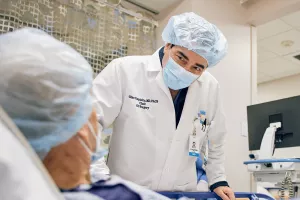Your urinary system's main job is filtering toxins, removing waste from your blood and creating urine. When your system isn't working right, you may develop bladder or kidney infections, kidney stones and incontinence. We can help balance your system and get you going again.
Get on the right tract
If you have pain or produce too much or too little urine, it's likely due to problems associated with your urinary system, also known as your urinary tract. The urinary system includes your kidneys, bladder, thin tubes that pass urine from the kidney to the bladder called ureters, and a tube that allows urine to leave your body called a urethra.
In men and persons assigned male at birth (AMAB), the urinary system includes reproductive organs that produce and discharge sperm. In women and persons assigned female at birth (AFAB), urologists treat pelvic issues like a "fallen bladder" or pelvic organ prolapse.
We combine the expertise of urologists, urogynecologists and colon and rectal surgeons who provide advanced care and use the latest surgical techniques. We're here to talk you through treatment options and give you peace of mind so you can confidently go about your life.

Conditions
Millions of people are diagnosed with urinary conditions every year. We help relieve common urinary conditions like urinary tract infections, kidney stones, and incontinence as well as more complex issues like bladder or prostate cancer. Conditions we treat include:
Testing
Even if you think your symptoms are minor, seeing a specialist to rule out diseases like kidney and bladder cancer is important since symptoms often mimic other urologic conditions.
Generally, you'll be referred if you have pain in your pelvis area, have trouble with leaks or feel like you need to pee too frequently. Based on your needs, we'll recommend tests to get to the bottom of the issue and get you on the path to wellness:
- Physical exam
- Blood tests
- Urine tests
- Ultrasound
- Computerized tomography scan (CT scan)
Treatments
We provide advanced surgical, robotic and medical treatments that relieve symptoms and improve your health so you can confidently return to your everyday life. We use cutting-edge technology and the latest surgical techniques like robotic-assisted surgery to perform complex procedures. Other treatments include:
- Aquablation® therapy
- Laparoscopic surgery
- Laparoscopic nephrolithotomy
- Kidney stone removal and management
- Robotic-assisted surgery
- Reconstructive urology
- Shock-wave lithotripsy
- Nutrition consultations
Kidney stones can be a major pain and majorly painful, especially if they block urine flow. Many small kidney stones can pass through your urinary system independently, but large kidney stones may lead to infections and complications so we step in to manage your pain and remove kidney stones.
But, our care doesn't end when your stone is gone. We test your blood and urine to identify risk factors that may predispose you to kidney stones and provide recommendations for preventing future stones. You may be referred to a specialist in nutrition, nephrology or endocrinology for further care or preventative treatment.
If you have a nerve, muscle or neurological condition, your doctor may recommend tests to measure bladder function and muscle health. We support patients who experience urological problems due to neurological conditions, such as multiple sclerosis, spina bifida, spinal cord injury and stroke.
We are skilled at performing an advanced procedure called Aquablation® therapy. The therapy uses a water jet controlled by robotic technology to remove the extra tissue. Since no incisions are made, you recover quicker and with fewer complications.

From regular office visits to inpatient stays, find the healthcare you need and deserve close to home.

Meet the doctors and care team devoted to supporting you every step of the way along your path to better health.